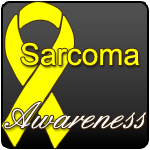
What is Sarcoma?
-
Updated: March 6, 2020
Sarcoma is a type of cancer found in tumors of connective and supportive tissues, such as nerves, muscles, joints, fat and bones, and it’s one of the most misdiagnosed and under-reported types of cancer.
Many cancer patients and their families have never heard of sarcoma because it’s extremely rare compared to other types of cancer – roughly 12,000 new cases a year in the U.S., which makes up only about 1 percent of cancer diagnoses in adults.
What are the different types of sarcoma?
There are two main types of sarcoma: soft tissue sarcomas and bone cancer.
Most sarcomas are soft tissue sarcomas. Because these types of tumors develop in muscles, fat, nerves, blood vessels, fibrous tissues, or deep skin tissues, they can be found virtually anywhere on the body in a person of any age, though sarcomas are most often found in the extremities.
The other, but much rarer type of sarcoma, is found in bone or cartilage, and is commonly referred to as bone cancer.
What are the symptoms of sarcoma?
The first sign of sarcoma is the appearance of a new lump underneath the skin. Still, the discovery of a lump is not an automatic indicator of cancer. It’s more likely the tumor is a benign lipoma, or a mass of cells that isn’t cancerous.
Growth of the lump over time, joint pain, and swelling, however, are signals of something more serious.
Pain in the bone is the most common symptom of bone cancer. The pain may be infrequent, but become more constant as the tumor grows larger.
What causes sarcoma?
Though scientists don’t yet know the cause of sarcoma, there are a few risk factors associated with the disease.
Radiation treatment, a damaged lymph node, and certain inherited diseases like Li-Fraumeni syndrome and Paget’s disease are all factors that could increase a person’s chance of developing sarcoma. Certain diseases, or a family history of diseases such as retinoblastoma, neurofibromatosis, Gardner syndrome, Werner syndrome, Gorlin syndrome, and tuberous sclerosis are also risk factors. Exposure to chemicals such as Agent Orange and vinyl chloride, a chemical used in making plastics, have also been linked to sarcoma.
If you’re worried or unsure about your risk of developing sarcoma and other cancers, genetic testing is an option for family members of sarcoma patients. The Risk Assessment Program at Fox Chase, for example, works with family members to evaluate any inherited genetic factors that can increase the hereditary risk of cancer.
How is sarcoma diagnosed?
If an oncologist suspects sarcoma, they should first get an MRI, CT scan, or PET scan to see inside the patient’s body, and then take a biopsy of cells inside the lump, working with a pathologist to determine the precise type and stage of sarcoma.
From there, doctors will determine the best form of treatment: surgery, radiation treatment, chemotherapy, or targeted therapy.
Because there are more than 50 different types of sarcomas in almost any location and because the disease is so rare, it’s often difficult to detect. A general surgeon may mistake a malignant sarcoma with a benign lipoma, and perform surgery to remove the mass, only to discover the tumor was cancerous later on.
That’s why it’s important to consult a team of medical, surgical, and radiation oncologists with experience in treating sarcoma for proper diagnosis and treatment.
Is sarcoma survivable?
Sarcoma survival rates vary based upon the staging, type, and location. Many patients with a low-grade soft tissue sarcoma are cured by surgery, whereas more aggressive sarcomas are harder to treat.
According to the American Cancer Society, this year about 12,000 will be diagnosed with soft-tissue sarcoma in the U.S., and nearly 5,000 will die of the disease, about 42 percent. Approximately 3,000 new cases of bone cancer will be diagnosed, and about 1,500 deaths are expected, roughly half of patients diagnosed.
But, those rates are improving, and will continue to improve with greater awareness, advocacy, and funding for research. There are a number of clinical trials to develop new treatments for sarcoma.
Learn more about sarcoma and the treatment options available at Fox Chase.
